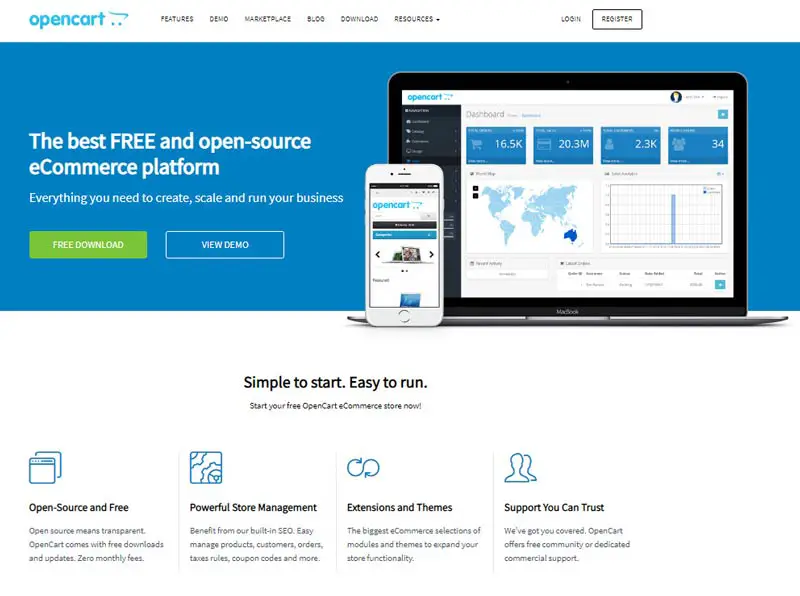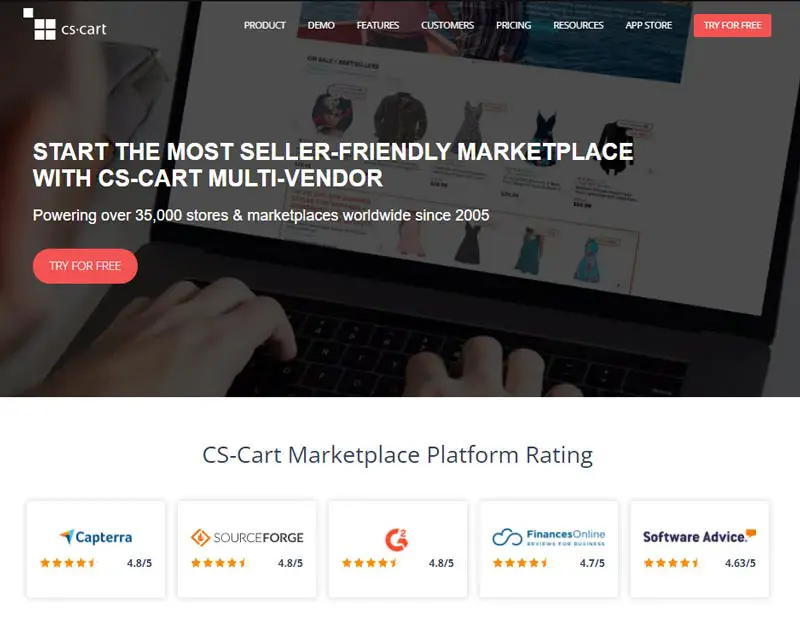Due to their naturally complicated processes, eCommerce platforms tend to be complex and highly advanced. The ability to bring an efficient shopping experience requires extra support to provide versatile online shopping features, multiple billing options, and a variety of order delivery and tracking methods.
The goal of lightweight eCommerce platforms is to enable small and startup businesses to run their online shops easily with no extra effort.
Lightweight eCommerce platforms are suitable alternatives for small businesses. Professional systems like Shopify and WooCommerce usually come with tons of features. They also provide extended scalability and customization options. All this is not always necessary for small and startup online merchants, where just a basic type of online presence might be enough for their business.
Additionally, in most small and new online businesses, sellers don’t necessarily have the required skills to run high-performance solutions. Neither are they willing to pay for developers to have their shops installed and customized. Especially if they are offering a relatively small number of products and have limited available selling options. For these reasons, they look for something simpler, more lightweight, less distracting, and of course, can do the job.
We present a list of the simplest and most lightweight eCommerce platforms that allow small businesses to easily establish their online shops.
1. OpenCart
OpenCart is one of the simplest eCommerce platforms. It’s well-known for its lightweight and easy-to-use functionalities. Basically, OpenCart is a free and open-source shopping cart system that provides an online store solution for small businesses.
According to their official website, OpenCart powers almost half a million eCommerce entrepreneurs all over the world, from corporations to local businesses.
Moreover, according to a study of the top eCommerce platforms by market share, Opencart has 6% of the market share in the United States, 10% in the United Kingdom, and 5% in Australia. While it dominates the Russian market with 47% of the market share.

Besides, as a free and open-source solution, OpenCart is a recommended option for small businesses that don’t have enough budget to spend on their online store. The software is completely free to download and comes with no-cost updates, so it helps to cut down the initial setup costs.
The software has a vast number of extensions that enrich the shopping experience. Users can download them from the OpenCart Extension Store. However, although many of these very appealing add-ons are free, some costly extensions might be sometimes necessary.

OpenCart has a widespread community around it. This is always great for any software to find answers to common questions or to seek support when having technical problems.
OpenCart: A widespread community to share problems and discuss common issues!
Nonetheless, the simplicity of OpenCart doesn’t come at no cost. The platform lacks many functionalities that you might find in other shopping cart systems. For this reason, it is well suited for small and medium-sized businesses while it’s not recommended for advanced online stores with much potential for future expansion.
OpenCart Pros
- Free and open-source solution, it comes with free updates with zero fees.
- Simple and easy to use with uncomplicated backend configurations.
- A decent community that shares problems and discusses common issues.
- Multiple levels of flexibility and customization.
- Rich admin dashboard with all the basic functionalities and store analytics.
- A large number of extensions and plugins available online.
- Built-in support for various types of online payment gateways.
- Support for multivendor stores with a single management interface.
OpenCart Cons
- Not suitable for advanced online businesses.
- As a simple solution, it has a limited number of available features.
- Limited wholesale functionalities with some needed custom work.
- Some extensions are often necessary but they are not free.
- Limited SEO support and functionalities.
2. PrestaShop
PrestaShop is a lightweight and simple open-source eCommerce platform that is well suited for both startup and advanced businesses. It’s free software to set up an online store.
According to their website, PrestaShop runs nearly 300K sites across the globe and leads the open-source eCommerce solutions in Europe and America.
PrestaShop: A leader of the open-source eCommerce solutions in Europe and America!
PrestaShop has a rich community with more than 1M community members, 1K contributors, and over 250 agencies. Such communities are always a bonus for any software to find answers to users’ questions and get in touch with other members with similar stories.

Like any open-source licensed software, PrestaShop has the challenge of generating revenue. For this reason, the company offers a marketplace of modules and templates to enrich the store’s potential.
The add-on modules can be used to add new features to the basic software, while the templates bring customization functionalities to the website theme. The business model allows also other developers to sell their own themes and add-ons.
PrestaShop provides a demo to test the interface and discover the eCommerce features they provide.

Furthermore, the software gives startup businesses many options to manage their online store. Nonetheless, it can scale up to meet the needs of intermediate and large-scale merchants using its large library of available add-ons. But keep in mind, most extensions are paid and sometimes they might get very expensive.
PrestaShop Pros
- Lightweight and easy-to-use platform with a beautiful interface.
- Ability to extend built-in functions using modules.
- Strong community to find solutions to common issues.
- Hundreds of built-in features include most of the basic requirements to get started.
- Clean and well-organized dashboard with direct access to all important functions.
- Attractive and high-quality (paid) modules and templates.
- Many options available for customization.
- Easy to implement on-page SEO techniques.
PrestaShop Cons
- Some add-ons need to be purchased to extend the software functionalities.
- You might need to invest in a web developer to get some help or to implement complex changes.
- Some add-ons are too expensive, so the software can get expensive very quickly.
- Limited user guide and help materials.
- Limited documentation and customer support.
3. Ecwid
Ecwid is an eCommerce tool for small businesses to help them run their online stores quickly and easily. The Ecwid software is significantly different from the other known lightweight eCommerce platforms because it brings online store functionalities to already existing websites.
Ecwid: To bring eCommerce functionalities to existing websites!
That said, Ecwid is a web-based software that can be integrated with other websites. Such as the ones built in web content management systems like WordPress, Joomla, and Drupal. It can be also integrated with pages on Google, Amazon, Facebook, Instagram, and TikTok.
It’s a simple eCommerce tool that integrates with other sites to convert them into online stores.

As a lightweight eCommerce solution, Ecwid isn’t suitable to build a professional standalone store. Instead, it’s well suited for freelancers and small businesses to add limited eCommerce functionality to multiple existing websites.
Furthermore, Ecwid follows the Software As A Service model. This means you won’t be able to download the store and re-publish it on your self-hosted domain. Instead, you need to subscribe to host your store on their website and pay annual or monthly subscription fees.
The “Ecwid” name is derived from Ecommerce + Widgets. Hence, the software relies on small pieces of code called widgets that users should put on their websites to display the store interfaces and functionalities. These relatively simple and easy-to-use components bring the ability for easy integration with a wide range of web platforms.
Ecwid Pros
- Lightweight shopping cart for freelancers and small businesses to set up online stores very easily.
- Very easy to use and set up with minimal time and training.
- Integration with many websites and social networks.
- A totally free plan is available (but limited).
- Single dashboard with centralized inventory, order management, and pricing.
- Runs as SaaS, so nothing needs to be installed on your device.
- Helpful and good customer service.
Ecwid Cons
- A website is needed to set up an online store with Ecwid.
- Coding skills are sometimes preferred to do the integration.
- Not suited for fully functioning and extendable online stores.
- SaaS model, so your store will be hosted on Ecwid and you don’t own the software.
- Limited customization and styling options.
- Very limited free plan.
4. CS-Cart Multi-Vendor
CS-Cart is basically a shopping cart application. It brings the essential functionalities to set up a full-featured online store. The software is a web-based open-source solution which makes it extendable to meet specific needs or add extra features.
According to their website, CS-Cart powered over 35K stores and marketplaces all over the world since 2005. Additionally, The software has a relatively high rating (4.75 out of 5) on the most popular business software review platforms in the software industry.

Initially, the software started with the CS-Cart shopping cart software. It was a simple tool for a single-seller online shop builder. Later, the company introduced the multivendor marketplace software which is now a standalone self-hosted eCommerce solution.
CS-Cart Multi-Vendor: A high-quality and stable eCommerce solution!
CS-Cart Multivendor is a standalone eCommerce marketplace platform that comes in multiple versions. Standard and Plus versions are suitable options for small and up to medium-sized businesses, who seek an easy-to-use and fast-launched online store. However, the software also comes in more advanced versions that support large and custom projects.
In comparison to other available platforms in the list, CS-Cart Multi-Vendor looks very expensive. However, although it is not a free solution, it does have open access to the source code which makes it fully customizable.
CS-Cart Pros
- High-quality and stable eCommerce solution.
- Simple lifetime license purchase with little to no restrictions.
- Various plans are available for different business levels.
- Variety of available features and plugins.
- Powerful admin interface and mobile app support.
- Tools to support search engine optimization.
- Built-in design and layouts editor.
CS-Cart Cons
- The product is completely paid with no free plan.
- Limited free updates for the startup versions.
- Relatively expensive, even for the standard version.
- Expensive add-ons to add extra features.
- Not as easy to use as it is meant to be.
- Very limited and paid customer support.
5. Square Online
Square Online (formerly known as Square Online Store) is primarily a simple and easy-to-use builder for eCommerce websites. The software offers a free website for retailers and startup businesses to open traditional online stores, list products, and process payments.
It’s worth noting here that Square Online and Squarespace are completely different eCommerce solution.
Like other simple platforms, Square Online is only suitable to build basic eCommerce websites. While it gets fairly difficult to create or run a complex online store using the software. It’s usually a recommended solution for merchants who just want to sell a few products online.

Square Online offers free all-in-one online commerce functionalities for various small businesses such as retail and restaurants. Moreover, it also integrates with the Square POS tool.
Square Online: A totally free plan with transaction fees!
In terms of pricing and plans, Square Online offers a completely free plan to build a website and start selling online. However, there will be still processing fees you should pay per transaction. Other paid plans are also available for more advanced features.
Square Online also offers solutions to sell on social media platforms. It can integrate with Instagram by tagging products in the posts to let the followers shop from Instagram. Integration with Facebook and Pinterest is also available.
Square Online Pros
- Simple and easy-to-setup and maintain eCommerce platform.
- Available free plan and relatively cheap paid plans.
- Integration with add-ons and third-party software.
- Integration with Instagram, Facebook, and Messenger.
- No coding skills are required.
- Easy to apply search engine optimization techniques.
- Good customer service and technical support options.
Square Online Cons
- Limited customization and design capabilities.
- Limited features when compared to other platforms.
- Lack of payment options.
- The templates library is very limited.
- They might revoke what they consider “risky” accounts.
6. Other Lightweight eCommerce Platforms
Apart from the mentioned systems in this list, there are other simple eCommerce platforms that startup businesses might use to run their online store.
We mention here some of them knowing that all these tools are most suitable for individuals and small businesses that might not be expanding in the future.
| nopCommerce | nopCommerce is a free open-source eCommerce solution for online stores. It allows shopping cart creation by providing a catalog frontend and an administration backend. |
| Big Cartel | Big Cartel is a simple online store builder for artists and creators. It provides designers, musicians, artists, and crafters with an online store to sell their products. |
| X-Cart | X-Cart is a commercial open-source shopping cart software. It has a built-in website builder to customize websites and online stores using drag-and-drop functionality. |
| osCommerce | osCommerce (open-source Commerce) is a free eCommerce and online store management software program. It was one of the earliest open-source shopping cart software. |
| simpleCart | simpleCart is an open-source and lightweight shopping cart software. It is based on JavaScript and integrates with existing websites. |
| CubeCart | CubeCart is a simple free and open-source shopping cart software to sell digital products and services online. |
| VirtueMart | VirtueMart is a simple and lightweight eCommerce solution. It’s not stand-alone software, instead, it’s designed as an extension of Joomla! content management system. |
| Shopaholic | Shopaholic is a scalable and flexible open-source eCommerce plugin for October CMS. It’s an ecosystem of plugins and themes for rapid e-commerce website development. |

